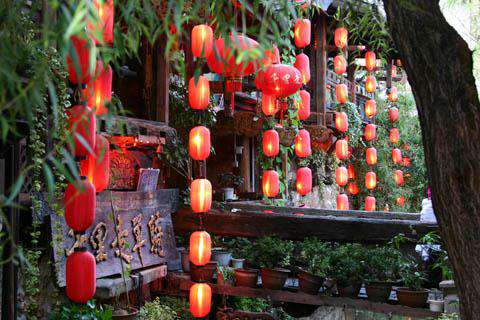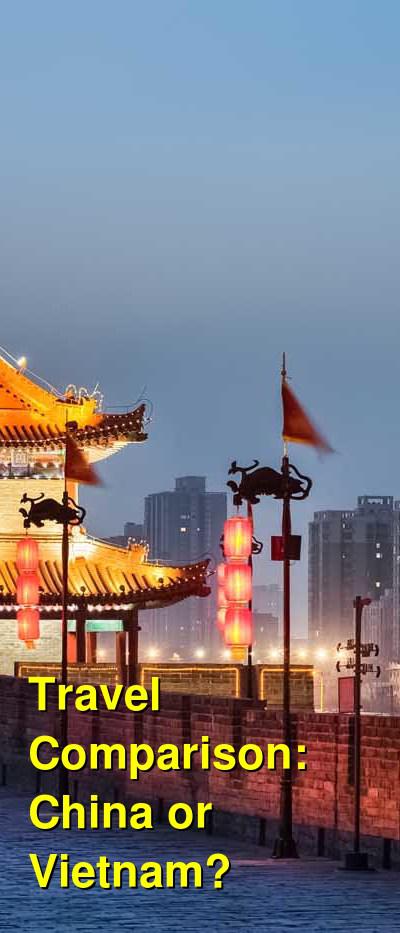Should you visit China or Vietnam?
Neighbors China and Vietnam share a similar culture and history. But the smaller Vietnam is a little cheaper, and mostly warmer, than its larger northern neighbor. Both countries offer a great deal of amazing sights, attractions, and culture to visitors.
China is massive, diverse, enigmatic, beautiful, and chaotic. And you should definitely go! But it's hard to summarize the price of everything in a country as large as this. From sprawling metropolises to sparsely populated countryside, the price of travel in China is as diverse as its attractions. Large cities are generally higher in price than the countryside, but overall China is surprisingly affordable.
In the last decade, tourism has surged in Vietnam. The reasons are obvious, as this diverse and beautiful country offers much to do and see to the visitors. While the beaches are nice, the real gems are the authentic local experiences to be had in every region, from floating markets in the Mekong Delta to trekking through the Hmong villages and rice terraces in the north. And don't miss the stunning landscapes of Halong Bay, either.
Vietnam offers a terrific value to tourists as prices are cheap, accommodation options are of good quality, transportation is efficient, the food is amazing, and the locals are friendly.
Which country is cheaper, Vietnam or China?
Should I visit China or Vietnam? This is a popular question for many travelers. By figuring out which country is more expensive, you'll understand where you'll get more bang for your buck. A week in Vietnam can cost you about $421 (per person), while a week in China may cost you around $556. These differences become even more noticable if you plan to spend a longer time in the country. 10 days, two weeks, or even one month of travel to Vietnam or China can really add to your travel budget.
Accommodation is often cheaper in Vietnam compared to China ($27 vs. $34). Budget travelers usually stay in less expensive hostels and guest houses, while nicer hotels often appeal to families and upscale travelers.
Or, compare hostel and guesthouse prices between Vietnam and China to find the cheapest accommodation here: Vietnam hostels and China hostels.
When comparing food in China vs. Vietnam they are not just different in cuisine, but also in price. Meal and restaurant costs in China ($23) are often cheaper than Vietnam ($14).
When is the best time to visit China and Vietnam?
 Lijiang, China
Lijiang, China
As China is geographically large, the weather varies by region. The northeast experiences four seasons, while the south is fairly mild and tropical. The west can be cold in the winter as well, and sometimes harsh in the high plateaus and mountains.
In northeastern China, winters can be very cold and less tourists visit during this time. However, some areas have winter festivals (such as Harbin) which bring in large crowds despite the chill. Summers in the northeast can be warm, and sometimes hot and humid. This is still the peak season in this region, especially in Beijing. Traveling in the shoulder season will usually give you lower prices and good weather.
In the south, from Shanghai down and across to southwest China, expect warm weather almost all year. While winters do get a little cooler, it's not much to worry about. For this reason, travelers visit southern China year-round. Some even avoid the warmer summers in favor of the cooler winters.
In the west, the mountains make everything a little more complicated. Even in the usually warm southwest, higher elevations equate to colder weather. As you venture into the northwest, expect frigid winters but mild summers.
Other than weather, the only thing to look out for are the Chinese national holidays. During these times, which usually last a weekend or a whole week, many local Chinese people will be traveling to experience their own country's grand beauty. Expect hotels to be full and transportation to be crowded. You may wish to avoid the country during these times, or hunker down in a smaller city. Make reservations in advance if you can.
Vietnam is warm all year, so just accept that you'll be in a tropical country. There is really no best or worst time to visit, as you'll probably be visiting the entire country during your trip which spans multiple climate regions. At higher elevations, the weather is significantly cooler. Fortunately, some of the higher elevation towns are on the must-see list, so that should alleviate some of the heat during your trip.
In the north (Hanoi), summer months are hotter and have more rain, while winter months are dryer and cooler. In the central area (Danang & Hue), it's dry but very hot from January to late summer, and rainy from the summer through December. In the south (Mekong Delta), it's hot and dry in winter months, and hot and wet in summer months.
Other than the weather, local festivals in various cities might make you want to visit, or leave, a particular area for a short period of time, but this varies by location.
Why is China more expensive than Vietnam?
China's economy has been growing in leaps and bounds in recent years and decades, leading to a growing middle class and rising tourism industry. While competition is keeping prices down, it's not enough, thus tourism prices are generally increasing. Furthermore, with large populations moving to the larger cities looking for work, the overall cost of living is going up.
Transportation in China is also become more high-tech. With bullet trains, subway systems, and internet-enabled ride sharing services, moving around is becoming more convenient, but also more expensive.
As a country on the rise (some still use the term "developing"), Vietnam as a whole is quite cheap. A large influx of tourists has led to a rise in the tourism business, but a pro-business government has allowed competition to flourish, leaving prices fairly low. This means that every mom and pop has opened a hotel or a restaurant catering to travelers. Quality might be inconsistent, but the options are plentiful.
What are the most expensive and cheapest cities and regions in China and Vietnam?
 Rice Terraces near Sapa, Vietnam
Rice Terraces near Sapa, Vietnam
Like large cities in any part of the world, with more people comes more diversity in prices. Some of the most expensive hotels and restaurants in China can be found in Beijing and Shanghai, as well as other touristy areas. But at the same time, these crowded cities also offer cheaper options.
Western China can be an expensive region due to its remote location. Here, transportation is pricey, food is more scarce and thus more expensive, and hotels are less frequent. But this enigmatic region can be worth the visit, and isn't too much more expensive than the more populated eastern regions.
Otherwise, some of the most expensive places in China are those that require more activities. A cruise through the famous three gorges, for example, is a must-see, but not so cheap. Hiking in the mountains or visiting famous parks that require entrance tickets, while worth the visit, can add to your travel budget.
Tibet is also relatively expensive due to travel restrictions, remote locations, and a lack of infrastructure.
As Vietnam is a highly populated country, even visiting the smaller towns or the countryside means that plenty of infrastructure, accommodations, and restaurants are available. This means that prices are fairly consistent even in more rural areas compared to other countries. Rural in Vietnam does not have the empty feeling that it does in other countries.
In the big cities such as Hanoi, Ho Chi Minh, Da Nang, and Hue, a variety of options are available for food and hotels. Prices can be higher if you want more luxury, but cheap options abound everywhere, too. Generally, the more touristy a destination, the higher one can expect prices to be for tourist-related activities. But food and other goods tends to stay consistent.
How you can save money when visiting China and Vietnam?
Use public transportation whenever possible. China's network of trains between cities has grown lately, and high speed rail lines connect every major city in the east, as well as some in the west. Not only is it fast, but it's also affordable. In Vietnam, take local transportation and avoid the multi-day tours that prey on tourists and backpackers. Buses go everywhere in Vietnam for a very cheap price. Taxis are not too bad, either.
Look into the price of flights. The Chinese government subsidizes many flights and airlines, leaving you with plenty of ways to get around this huge country fairly quickly.
Overall, if you want to save money in both China and Vietnam, the rule is "go local". Eat local food, as it's not only yummy and healthy, but also very cheap. Locally owned hotels and hostels are also very cheap. Think small and your wallet will thank you - and you'll have a more authentic experience, too.
Negotiate, negotiate, negotiate, negotiate! When you're done, negotiate again. Vietnam is one of the most difficult countries in the world for bartering. It's even worse than Thailand. Hold your line, stand firm, and be prepared to walk away if you don't like the price. After that, you'll be surprised at how prices will come down just a few seconds later. Read up on negotiating strategies such as "cut their offer by a third when you counter offer, and don't pay more than half."
Shop around. Don't go for the first thing you see, whether it be a small souvenir, a hotel, or an all-inclusive tour. Whatever it is that you're looking at, chances are there's another right next door. This might sound comical, but once you're there, you'll understand.
Overnight buses are a good way to get around and avoid paying for a hotel room at the same time. (Just don't expect a great sleeping experience.)


 Budget Your Trip is all about finding out how much everything costs so that you can travel cheaper and longer. Created by avid travelers Laurie and Bryan, our goal is to help you plan your next trip on the right budget. With average daily travel costs that are calculated from the budgets of real travelers, plus an analysis of hotel and tour prices, you can find out how much money you need to plan your next adventure. We also have plenty of travel advice, accommodation reviews, and activity suggestions.
Budget Your Trip is all about finding out how much everything costs so that you can travel cheaper and longer. Created by avid travelers Laurie and Bryan, our goal is to help you plan your next trip on the right budget. With average daily travel costs that are calculated from the budgets of real travelers, plus an analysis of hotel and tour prices, you can find out how much money you need to plan your next adventure. We also have plenty of travel advice, accommodation reviews, and activity suggestions.
